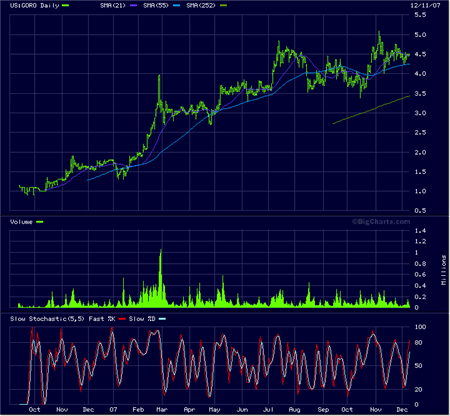Can central banks stop the credit crunch?
The Bank of England - along with fellow central banks - announced new plans to save the world from the subprime crisis yesterday. But more borrowed money won't make up for careless lending, says John Stepek.

Get the latest financial news, insights and expert analysis from our award-winning MoneyWeek team, to help you understand what really matters when it comes to your finances.
You are now subscribed
Your newsletter sign-up was successful
Want to add more newsletters?

Twice daily
MoneyWeek
Get the latest financial news, insights and expert analysis from our award-winning MoneyWeek team, to help you understand what really matters when it comes to your finances.

Four times a week
Look After My Bills
Sign up to our free money-saving newsletter, filled with the latest news and expert advice to help you find the best tips and deals for managing your bills. Start saving today!
This feature is part of our FREE daily Money Morning email. If you'd like to sign up, please click here: Sign up for Money Morning
Earlier in the week, it was Led Zeppelin's comeback tour. Now today, another ageing supergroup is grabbing all the headlines.
Ben Bernanke, Mervyn King, and their counterparts at the Swiss, European and Canadian central banks have decided to join forces to save the world from the subprime crisis.
MoneyWeek
Subscribe to MoneyWeek today and get your first six magazine issues absolutely FREE

Sign up to Money Morning
Don't miss the latest investment and personal finances news, market analysis, plus money-saving tips with our free twice-daily newsletter
Don't miss the latest investment and personal finances news, market analysis, plus money-saving tips with our free twice-daily newsletter
The Fed and pals will pump more money into the markets to try to ease the credit crunch. There's all manner of fine print, but essentially, a wider range of banks will be able to borrow more money, at lower rates, and secured with lower quality collateral. And importantly, they'll be able to do it anonymously, so no more fear of ending up like Northern Rock.
The big question, of course, is will it work?
Why more borrowed money can't make up for careless lending
Can the Federal Reserve and the other central banks avert a recession and return us to the good old days of fast-flowing free and easy money?
Well, let's just think about this for a moment. Market interest rates (Libor, the rate at which banks lend to one another) have risen far above the base interest rate because banks are unwilling to lend to one another. The reason for that is because they've basically already made too many bad lending decisions.
They dished out too much money to people who couldn't pay it back. The economic backdrop in the US is terrible, and it's weakening in Britain and Europe too. That means that even people who were reasonable credit risks last year, are becoming less acceptable credit risks today.
So there's a lot of bad debt and potential bad debt out there. Banks have been reluctant to expose themselves to even more by lending to other banks whose balance sheets might be so damaged that they'd be unable to pay them back. They want to keep as much money as they can to hand so that they can resolve any problems of their own.
So the basic problem is that banks have already lost too much money, or have put too much money at risk, and they don't want to lose any more.
So the fact that the Fed and pals are now making more money available to borrow at cheaper rates, doesn't necessarily meant that this will then get passed on to consumers.
At best, the new money will bail out financial institutions that are genuinely in trouble, such as Northern Rock. But banks have had a major scare. They will want time to repair and regroup, and to find out what other nasties are lurking on or off their balance sheets.
Bankers still "don't know where the bodies are buried"
As Neil McKinnon of ECU hedge fund group tells Ambrose Evans-Pritchard in The Telegraph: "There's a real danger that this may not work. Both the Fed and the ECB have injected a lot of liquidity before, but the banks are hoarding it the reason is that people still don't know where the bodies are buried."
Meanwhile, Julian Jessop of Capital Economic adds that "risk premiums are likely to remain permanently higher after the excesses of the last few years, and it will still be harder to obtain credit."
So what does it all mean? In short, recession hasn't been averted. House prices are still set to fall. The consumer, who fuels 70% of economic growth in the US and the UK, is still headed for far tougher times, which means those economies are too.
Meanwhile, by pumping ever more money into the system, the inflation risks grow ever higher. Because regardless of what official figures say, Milton Friedman was right when he said that "inflation is always and everywhere a monetary phenomenon." In other words, increase the supply of money faster than the supply of things to buy, and you get inflation, simple as that.
An investment for hard times
Inflation on one hand, economic collapse on the other what's an investor to do? Regular readers know the answer buy gold. And here's our commodities correspondent Dominic Frisby on what he believes is a particularly attractive gold mining stock at the moment.
"One of my favourite junior mining companies and one that hasn't sold off, unfortunately for those that want to buy is Gold Resource Corporation (US:GORO).

"The group is listed in the States, on the OTCBB, the American equivalent of our AIM market (you should be able to buy OTCBB-listed stocks from larger brokers like Barclays).
Under the stewardship of the Reid family, who I have got to know very well, they have been developing four excellent properties in Mexico. They listed in Autumn 2006 at one dollar and now trade at $4.50, a juicy four-bagger for those that held on.
Last week they successfully raised over twenty million dollars at $4 a share. This should take them into production some time late next year. Then the day before yesterday, they announced fantastic drill results. Yet the market hardly re-acted. They were too busy watching Bernanke.
"GORO is one my biggest positions - it won't multibag from here like some grassroots exploration plays, but it doesn't carry anything like the same risk either. If this consolidation in gold continues, and we get a pullback in GORO, I think it's one to buy and lock in the drawer along with your Krugers and Sovereigns."
Treat yourself to a Christmas bonus
Thanks Dominic. Dominic will be giving his views on what 2008 holds, along with other regular MoneyWeek contributors including Paul Hill, James Ferguson and Tim Price, in the Christmas issue, out on December 21st. And James Ferguson fans won't want to miss this week's issue out tomorrow where James spells out exactly how far he thinks UK house prices could

fall. If you're not a subscriber, sign up now and get three free issues it's the perfect Christmas present for yourself: 3-week free trial.
And talking of Christmas, MoneyWeek's book "How Much?!" is still available, at just £6.99 for Money Morning readers - just put the promotional code MoneyW in the relevant box at the 'view basket' stage of your order. Click here to buy your copy now: How Much?!
Turning to the wider markets...
Enjoying this article? Why not sign up to receive Money Morning FREE every weekday? Just click here: FREE daily Money Morning email
Nikkei falls sharply on subprime fears
Having fallen as low as 6,429 yesterday morning, the FTSE 100 returned to positive territory as news broke of central banks' moves to ease the credit crisis. Overall, the blue-chip index added 22 points to close at 6,559. Housebuilder Barratt Developments topped the risers,whilst Northern Rock was the day's heaviest faller once more. For a full market report, see: London market close.
Elsewhere in Europe, the DAX-30 added 66 points to close at 8,076 in Frankfurt. And over in Paris, the CAC-40 added 18 points to close at 5,743
Across the Atlantic, US stocks brushed aside a mid-afternoon drop to end the day with moderate gains. The Dow Jones was up 41 points overall, at 13,473. However, financials including Citigroup weighed on the index. The Nasdaq was 18 points higher, at 2,671. And the broader S&P 500 added 8 points to end the day at 1,486.
In Asia, Japanese stocks fell sharply today as warnings from Wachovia and Bank of America renewed anxieties as to the extent of banks' subprime losses. The Nikkei lost 395 points to end the session at 15,536. And in Hong Kong, financials also weighed on the Hang Seng, which was down 776 points at 27,744.
Survey reveals estate agents' gloom
Crude oil futures rallied $4 in New York yesterday, but were down nearly 1% - at $93.54 - this morning. In London, Brent spot was at $92.90.
Spot gold was last trading at $810 this morning and silver was at $14.63.
In the currency markets, the pound was at $2.0404 against the dollar and 1.3882 against the euro this morning. And the dollar was at 0.6801 against the euro and 111.62 against the Japanese yen.
And in London this morning, a survey by the Royal Institute of Chartered Surveyors revealed that estate agents were the most pessimistic they have been about the UK housing market since 1998. The report revealed that the number of agents seeing house price falls outnumbed those seeing increases by 56%. Even the the London has now succumbed - the house price gauge for the capital showed its first negative reading for two years.
Finally, our recommended articles for today...
It's time this house price obsession ended
- Tom Bulford is sick of hearing commentators talking about house prices. For more on why he thinks focussing too much on property is unhealthy - plus why, for all the talk, interest rate decisions will have little impact on prices, read: It's time this house price obsession ended
How fund managers make you pay for their mistakes
- Beware: there is still plenty of investment toxic waste lurking in the market. Paul Tustain explains a particularly nasty - if rather clever - scheme professional investors are using to hide their subprime losses. To make sure you avoid this particular ploy, see: How fund managers make you pay for their mistakes
Get the latest financial news, insights and expert analysis from our award-winning MoneyWeek team, to help you understand what really matters when it comes to your finances.

-
 Should you buy an active ETF?
Should you buy an active ETF?ETFs are often mischaracterised as passive products, but they can be a convenient way to add active management to your portfolio
-
 Power up your pension before 5 April – easy ways to save before the tax year end
Power up your pension before 5 April – easy ways to save before the tax year endWith the end of the tax year looming, pension savers currently have a window to review and maximise what’s going into their retirement funds – we look at how